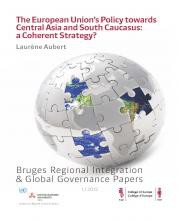The European Union’s Policy towards Central Asia and South Caucasus: a Coherent Strategy?

In 2007, the European Union (EU) launched the Eastern Partnership, including the South Caucasus, while simultaneously addressing Central Asia through a “Strategy for a New Partnership”. As the EU strategy towards Central Asia and South Caucasus (CASC) is being implemented and the Lisbon Treaty has given more tools for the EU to achieve greater coherence in its foreign policy, the question arises to what extent the EU’s strategy in the region is indeed coherent. Until now, the EU has not introduced any hierarchy between its objectives, but implements programmes and initiatives at various levels, thus making its strategy neither fully coherent nor sufficiently visible. If the EU wants its growing involvement to be translated into a bigger impact in CASC it has to achieve more coherence in its policy for and in that region. This paper provides both an analysis of the (in)coherence of the EU ’s policy in the region and some recommendations on how coherence could be further improved.
